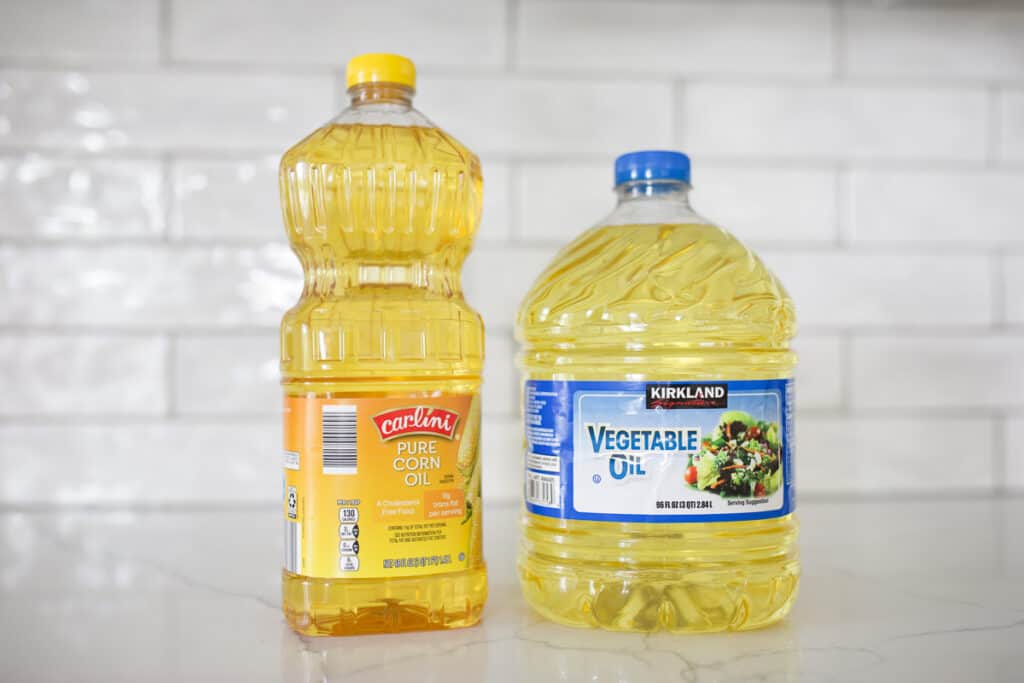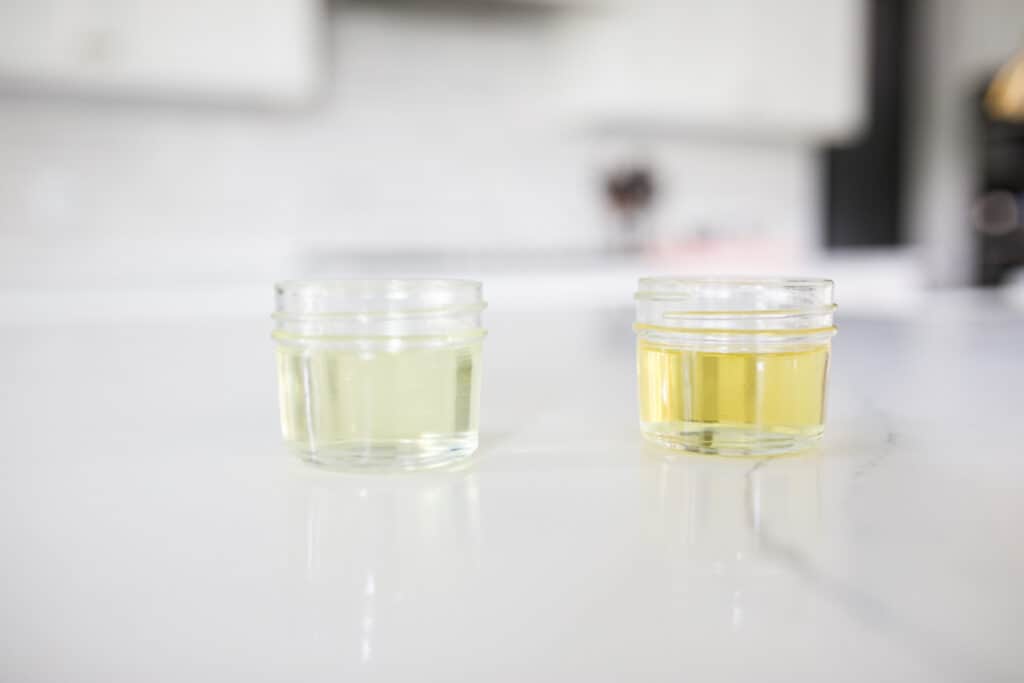There are a lot of similarities between corn oil vs vegetable oil. And they’re often placed side-by-side in the ‘neutral oils’ section at the grocer.
Vegetable oil is a generic term that refers to oil derived from a subset of plants, corn included. But also soybeans, canola, or a blend. Corn oil is specifically derived from corn.
The bottom line is that different kitchen jobs benefit from different oils. And there are a few things you should know about corn and vegetable oil before blindly picking one over the other. That said, if you’re in a pinch substituting one for the other will be fine.

Table of Contents
Smoke Point
Knowing an oil’s smoke point will help you determine if it’s suitable for a particular application.
For example, using low-heat oil for a high-heat recipe can be a real health and safety hazard. So, depending on the intensity of the heat in your recipe, one oil may hold up better than the other.
Corn Oil
The smoke point of corn oil is 450°F.
This is an appropriate level for deep frying or just frying in general. It also makes corn oil a good fit for baking recipes that involve high oven temperatures over a long period of time.
Vegetable Oil
Because there isn’t a uniform blend for vegetable oil, the smoke point may vary. Generally, it’s less than corn oil, though. 428°F is a common threshold.
Most vegetable oils are blended using a considerable amount of canola oil, which has a low smoke point. So it is great for cooking in general. But if you need it for a specific recipe or cooking method, you’d better read the label on the bottle so you know exactly what to expect.
Bottom line: Corn oil has a higher smoke point of 450°F than vegetable oil, which varies depending on the blend. Corn provides a better margin of safety for frying something like chicken wings, but vegetable oil would work as well.
Read this if you’re curious about which oils have the highest smoke point.
Flavor and Color
The flavor and color of the oil can impact the recipe more than you’d think. Even the slightest flavor adaptation can cause an unwanted aftertaste.

Corn Oil
Corn oil is golden brown in color and is considered somewhat neutral tasting. It has a mild flavor, but not one that is overpowering. You might describe the flavor as nutty or slightly roasty.
In some situations, the flavor of corn oil might be an enhancement to whatever you’re cooking or baking.
Vegetable Oil
Vegetable oil is light in color and truly neutral tasting.
Veggie oil embodies the phrase, “it tastes like nothing.” The color and flavor have no impact on the appearance or taste of the actual recipe. It’s a better fit for baking and cooking dishes with a delicate flavor.
Bottom line: Vegetable oil is a more neutral/flavorless which works well with baking and sautéing among other things. The slightly nutty/roasty flavor of corn oil lends itself well to frying.
Price
Both vegetable oil and corn oil are affordable oils and are priced very similarly at about $0.10 per fluid ounce.
Bottom line: Both are very affordable oils priced very similarly.
Which is Healthier, Corn Oil or Vegetable Oil?
If you use an oil occasionally, you don’t tend to get into the details of its health and nutritional value. But If you intend to use an oil in your everyday cooking, the aggregate impact can affect your health.
Corn Oil
Corn oil is rich in polyunsaturated and monounsaturated fatty acids, which are healthier than trans fats and saturated fatty acids. Nutritionists say it helps improve cholesterol levels and reduces the risk of heart disease. It also has vitamin E, which is an antioxidant that helps protect the body from cellular damage.
Vegetable Oil
The nutritional profile of vegetable oil will vary depending on what oil blend it is made of and how it is processed. While buying veggie oil, always read the label for preservatives, calorie count, fat content, omega-6 fatty acid (good), and how it was processed.
Bottom line: Irrespective of choice, both oils are high in fats and calorie count and heavily processed. So, it is best to consume them in moderation along with a healthy and balanced diet.
Common Uses
Because corn oil is more flavored than vegetable oil and has a higher smoke point, the possibilities are endless.

Corn Oil
Corn oil is a great pick for deep frying, shallow frying, and baking (dishes that require the dish to sit in the oven at high temperatures for a long time). You can also use it as a medium for emulsion-based recipes. Some good examples would be mayonnaise and marinades.
Vegetable Oil
Vegetable oil has a lower smoke point as compared to corn oil. But its true strength lies in its flavorlessness. You can use it for cooking, sautéing, and baking. But most importantly, it does not overpower any of the subtle flavors in the recipe.
What It’s Made From
Vegetable Oil
Vegetable oil is often called ‘all-purpose’ oil due to its versatility. The term vegetable oil is actually an umbrella term. Generally, this oil is a blend of multiple oils derived from seeds, nuts, and various parts of vegetables and fruits.
The challenge when buying vegetable oil is that you don’t know what’s exactly in it. One brand will be different from the next.
Corn Oil
As you might expect, corn oil is extracted from the germ of corn kernels. This is where its classic golden yellow color comes from, as well as the mild flavor.
Recap
Although these oils are similar, flavor, color, and smoke points offer subtle differences that set them apart. Corn oil has a mild flavor that tastes incredible on fried foods. And vegetable oil is almost impossible to taste in any dish.
If you’re still curious about ‘neutral tasting’ oils and how to use them, we recently published a full roundup on how to pick the best neutral oil for your cooking method.
Vegetable Oil vs Corn Oil FAQs
Yes, you can use corn oil instead of vegetable oil without significantly altering the end results. But corn oil may slightly change the flavor of the dish as it is less neutral-tasting than vegetable oil.
Corn oil does contain vitamin E, polyunsaturated fatty acids, and monounsaturated fatty acids. But it’s not the healthiest oil option available. Corn oil is often highly processed so it should be consumed and used in moderate to low quantities.
Canola oil is a healthier option as compared to corn oil or vegetable oil. It is rich in heart-smart monounsaturated fats and omega-3 fatty acids. It also has a high smoke point and a relatively neutral taste making it a great option for a variety of cooking methods.

